Yeah, I’ve been away from Overthinking It for a while, writing books, making websites and Twitter accounts and such. But like the mob bosses always say, just when I thought I was out, they pulled me back in. “They” in this case being the writers of Adventure Time, because HOLY HELL is this show overthinkable. In my opinion, it’s the most overthinkable show on TV right now. Mad Men might come close, but it has less autotune and fart jokes, so advantage Adventure Time.
Can I compare Adventure Time to East of Eden for a sec? I’m gonna compare Adventure Time to East of Eden for a sec.
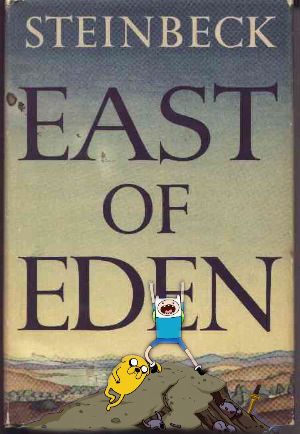
I’ve heard it said that East of Eden is a Great Book because it simultaneously works on a bunch of different levels. It works as a family epic, a religious allegory, a philosophical treatise, a discussion of America with a capital A, and so on. Similarly, the recent Adventure Time episode “All the Little People” has at least five levels of textual depth. It works as
- A simple fantasy story featuring a magician
- A Matrix-type story about different levels of reality
- A meta-type story about Adventure Time’s writers
- A meta-type story about Adventure Time’s fans and
- A coming-of-age story about love, porn, and masturbation
You can find explanations of all five readings elsewhere on the Internet, but let me go through them quickly before we move on what is, in my mind, a much more interesting discussion about how all five readings work together and how they work within the context of the series as a whole. If you’re already familiar with the five readings, you can skip my summaries and go straight to the analysis.
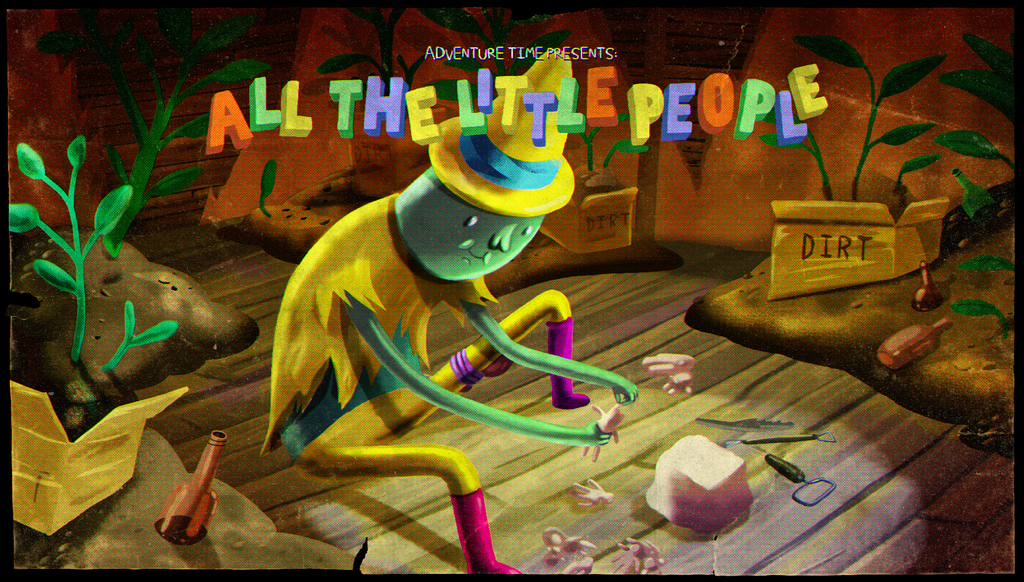
1) A simple fantasy story featuring a magician
“All the Little People” begins with Finn the Human and Jake the Dog hanging out in a post-apocalyptic landscape and having a discussion about love. Along comes Magic Man, the biggest jerkface in Ooo, who slips Finn a bag filled with small magical dolls. Each doll represents a character on Adventure Time, and while they aren’t exactly intelligent, they can interact with each other in interesting ways. While Jake is off with his pregnant girlfriend, Lady Rainicorn, Finn plays with the semi-sentient dolls, putting them into various romantic configurations to see who will hook up with whom.
Finn, as he is wont to do, becomes obsessed. For sixteen weeks he forces the little people to make out with each other, and they are miserable. Finally Jake comes home, sees that Finn has become a scary otaku hermit, and Finn realizes he has to apologize to the little people and stop this god game he’s been playing. Big Finn figures out a way to communicate with Little Finn so all the little people know they are free of his interference, and the little people have a dance party to celebrate.
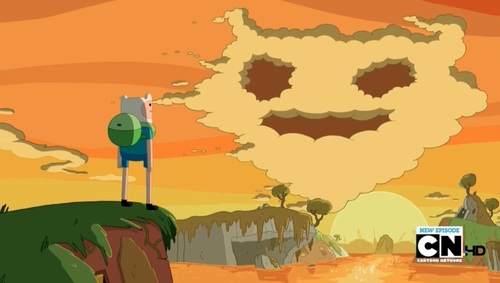
2) A Matrix-type story
Interestingly, when Big Finn talks to Little Finn at the end of the episode, he tells Little Finn “I’m not coming back,” which is exactly what Magic Man told Big Finn at the beginning of the episode. So there’s a suggestion that, just as Big Finn acts as God to Little Finn, Magic Man is God to Big Finn, which makes sense, seeing as Magic Man actually has a relationship with Grob/Gob/Glob/Grod, the four-faced deity of Ooo. So in Adventure Time there are at least three layers of reality: the supernatural reality of Magic Man and Grob, the regular world of Finn and Jake, and the mini-universe of the little people.
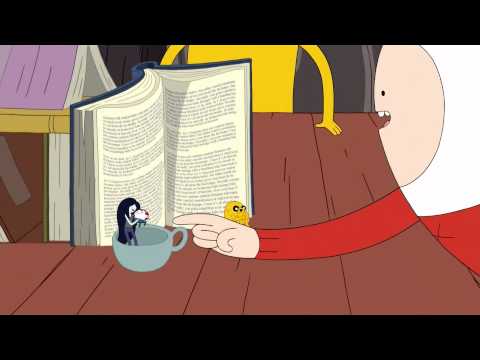
3) A meta-story about Adventure Time’s writers
Of course, we all know there’s a fourth layer of reality on top of those other three layers: the reality we the viewers live in, a world in which a human man named Pendleton Ward created a strange, wonderful little show about a post-apocalyptic Candy Land that somehow is airing on basic cable. Remember, in “All the Little People,” the god of each reality layer ruins the lives of the people living in the layer underneath them: Big Finn destroys the lives of Little Finn and his friends, Magic Man gives Big Finn his second nervous breakdown of the season, and the Adventure Time writers make all the characters on the show miserable.
Luckily, at the end of the episode, all’s well that ends well, and all the little people are enjoying themselves at a dance party. It’s as if Adventure Time’s writers are apologizing to their characters for involving them in so much romantic angst and psychological torture over the past few seasons. “Only dance parties and wackiness to come!” the writers seem to be saying.
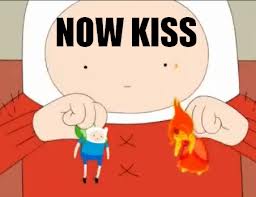
4) A meta-story about Adventure Time’s fans
Yet “All the Little People” remains a controversial episode of AT, mainly because some view it as an indictment of the show’s fans. Although I don’t think this is the most important reading of the text, the reading’s certainly there for the taking. When Finn forces different characters into threesomes, S&M situations, and hurt-comfort scenarios, it’s hard not to see it as a clever eyebrow raise toward those overzealous fans who write crack-pairing fan-fiction and create disturbing fanart. And when Jake reminds Finn that it is sometimes healthy to get out of your pajamas and leave the house, it’s hard not to see it as a sly dig at those of us who spend our free time writing ridiculous textual analyses of cartoon shows for children.
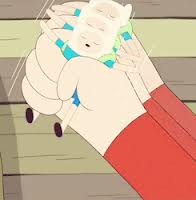
5) A coming-of-age story
But my favorite reading of the episode involves what I’ve previously dubbed “the most epic extended metaphor for masturbation ever seen in children’s television.” Not for nothing does the episode begin with a discussion of love and pregnancy, and not for nothing does it end with Big Finn jiggling “Little Finn” as quickly as he possibly can – at least until his arm gets tired.
Under this lens, “All the Little People” becomes a story about a teenage boy who
- is having doubts about his relationship with his girlfriend
- goes to his only real adult male role model
- who promptly freaks the boy out by essentially telling him true love doesn’t exist and that who you end up with is based purely on randomness –
- oh, and also the male role model will be moving out soon, because girlfriends ruin EVERYTHING and nothing is ever stable EVER.
- So the teenage boy goes home and reads a terrible book called Mind Games by pick-up artist Jay T. Doggzone hoping to find something that contradicts what his male role model just said
- and when that doesn’t make him feel any better he watches porn – again, hoping to learn something meaningful about love and sex.
- Vitally, the first porno he watches involves him and his male role model’s girlfriend. (Freud much?)
- The boy gradually realizes the porn is hurting everyone involved, including himself, but he Seriously. Cannot. Stop
- Finally he is able to jerk off one last time and promises to never do it again.
Poor Finn. Someone get that boy a shrink, stat.
So there you are. Five readings of one 11-minute episode. But how do we put them together? What are the writers really trying to say here?
I agree that this episode was meant to criticize masturbatory acts of creation, but I disagree that the reason those acts are bad was because of their controlled nature. You seem to conflate control over other people with control of your own creative process.
Also, I think that a strong case can be made that the purposeless creation which you read the authors as defending as an alternative is equally masturbatory. I guess I think that the authors are only criticizing a specific kind of controlling masturbatory creation, but that they’re okay with other kinds.
In other words, I think that the authors thoughts on masturbation are probably more nuanced than you demonstrate here.
Though, I have no idea what those thoughts actually are. I just think that there’s more to them than just this, because otherwise the message seems to have problems.
That should be Overthinking It’s new motto. “Overthinking It: Because the Author’s Thoughts on Masturbation Are Probably More Nuanced Than You Demonstrated”
I’ll make a t-shirt.
“Adventure Time is at its best and its characters are at their most fulfilled when they’re improvising songs and dances together on the spot.”
And yet the writers are probably forcing that as much as they are forcing any other moments of the show. “Now they have fun… THEY HAVE FUN DAMMIT! THEY ARE SPONTANEOUS!”
Their writing process is pretty loose really. They have a few points they want to get to storywise but the writers have a free hand in how those things happen. Pen Ward often compares it to playing DND.
What I like about AT is the knowledge that the program is 100% contrived and controlled by the creators, yet still feels spontaneous. It’s one mark of a quality program, because as TV viewers we expect the production process of a show to be “invisible.”
Furthermore, and in my experience, the process of creating a story or comic or illustration, etc, is as much a process of discovery on my part as it is contrived. There are times when I feel my mind has been hijacked by the thing I’m trying to create, as if my mind and body were merely the vehicle for the idea which exists independently. This episode of AT touches on that aspect of creation if we can regard Little Finn as an independent microcosm for Regular Finn.
I think it’s possible to connect this episode of AT to the “Godfellas” episode of Futurama, in which Bender finds himself acting as god with disastrous results. And it’s a theme that reaches across genres and formats, bringing to mind “Bruce Almighty” and novels such as “God’s Grace” (Malamud), and The Sims and countless other media products. It’s a theme in which characters grapple with the ethics of perceived control over perceived freedom, and is a way to question whether what Christians think of as God is a being without limit, and whether free will is something we truly possess.
As Finn continues to wrestle with hormones, identity, and alienation, perhaps he will find traces of his creators not in his world, but in the characters around him.
Totally math analysis, bro!
When I first watched this episode I pretty much just thought it was the writers castigating me for those six months I spent playing The Sims nonstop.
But the relationship between creation and, uh, relationships is definitely an theme in this show, now that you mention it. Your discussion of Princess Bubblegum’s creations was something I’d never considered before but it makes so much sense in this context. Her creation of Lemongrab and Goliad both follow the same (Frankensteinian) pattern: neither are what they are expected to be, both run amok, and both are only placated/subdued by the creation of an appropriate counterpart.
While the Ice King and Finn both use their little people to live out romantic relationships vicariously, Peebles’s find equilibrium only with near-clones of themselves created deliberately and personally for them.
Good point about Lemongrab. I wrote this post pre-“All Your Fault,” so I may have to amend what I wrote above. On the one hand, Lemongrab certainly did a lot of improvisational creating this week, randomly turning everything in his palace into a new horrifying, destructive creature. So spontaneous creation in Adventure Time isn’t all good all the time.
On the other hand, Lemongrab did have a plan going in: he knew in advance that he wanted to create more Lemongrabs so he could force them to love him. I personally feel that images of two Lemongrabs, er, loving each other have a somewhat sexual/masturbatory quality to them. They are grabbing their own lemons, if you will.
Hmm, now I wish I had brought Princess Monster Wife into his conversation. Also Jake’s puppies (created spontaneously, by accident, by two real people, and they turned out great because Jake stopped micromanaging them).
So many episodes involve themes of creativity. There are very few episodes in which a character is bent on destruction. The episodes featuring the Lich probably show the most contrast between creation and destruction that I can think of. Even episodes involving death and the Dead World don’t usually regard death as a destructive force, but as a phenomenon that robs the living of companions who still exist somewhere else.
I also think it would be fascinating to do a Freudian analysis of AT episodes, because I feel there is a lot of potential to explore the psycho-sexual neuroses of the characters. How do repressed sexual impulses drive AT characters to neurotic, antisocial behavior? Maybe the characters demonstrate alternative futures for Finn, whose inability to find a suitable sexual partner could drive him mad.
The main idea to purchase a blood pressure monitor is because you want a fast and accurate machine that you can easily operate at home. You want something that straps on and with a push of a button reads and finishes the reading in less than 3 minutes. That’s the standard you want to put up.
Magic man is the Devil. He is the only one that has contact with glob and was banished from a higher plane…. Plus, he makes everyone’s life difficult and introduces porn and masterbation to fin….